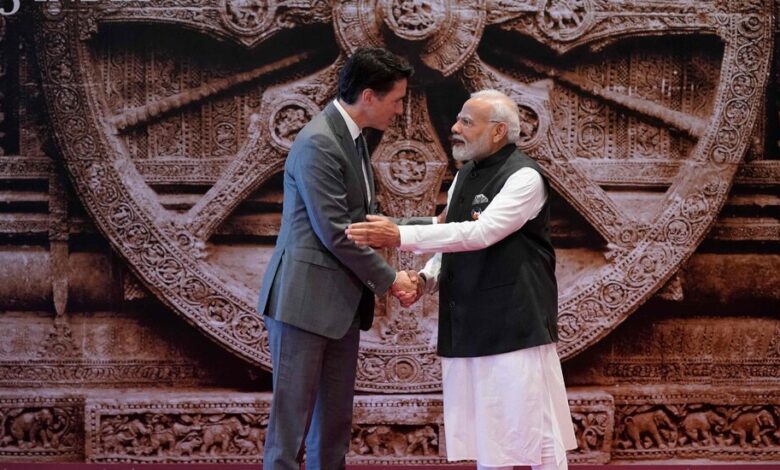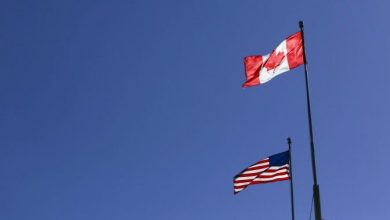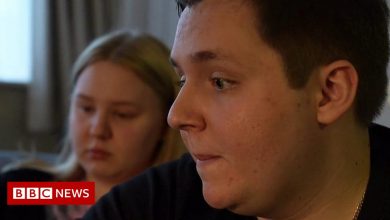What’s Behind Canada and India’s Diplomatic Tension?

The allegation was a bombshell: that India had been involved in the killing of a Canadian citizen on Canadian soil in June.
Canada’s prime minister leveled the charge on Monday, and an all-out diplomatic war soon followed. Canada pressed its allies to come together to challenge India, with statements of concern issued in Washington and Canberra, Australia. India moved to expel a top Canadian diplomat in a tit-for-tat move, and Indian officials lined up to air grievances with Canada.
But behind the plunge in relations to what officials and analysts called the lowest point ever were years of diplomatic tension. In New Delhi’s eyes, Western nations — most notably Canada — have stood idly by as extremist Sikh groups, including the one led by the murdered Canadian citizen, have supported a secessionist cause that threatens the Indian state.
Indian officials have accused their counterparts in Canada, Britain, the United States and Australia of inaction as the diaspora mobilization for Khalistan, the independent nation that Sikh secessionists want to establish in the Punjab region, has vandalized Indian diplomatic missions and threatened Indian diplomats.
Still, if the role of Indian agents is confirmed, it could mark a brazen new turn for India’s security agencies. While the Indian spy agency, known as the Research and Analysis Wing, or RAW, has long been suspected of involvement in targeted killings in neighboring countries, analysts and former security officials said the assassination of Hardeep Singh Nijjar would be the first such known case in a Western nation.
“The government of India needs to take this matter with the utmost seriousness,’’ Justin Trudeau, Canada’s prime minister, told reporters in Ottawa on Tuesday. “It is extremely serious and it has far-reaching consequences for international law and order.”
India’s response has been a reflection, in part, of domestic politics. The Indian government has long maintained that the Khalistan cause carries little support in Punjab. Yet governing-party officials painted the Sikh-dominated farmers’ movement of 2020 and 2021, the biggest challenge to Prime Minister Narendra Modi’s decade-long tenure, with the same broad “secessionist” brush they have applied to extremist Sikh elements abroad.
That has led many analysts to believe that Mr. Modi may be stoking Khalistan as a major threat as part of a tried-and-true political and electoral tactic in which he presents himself as the protector of India, particularly its Hindu majority.
Muslims in India have also paid a heavy price as Hindu nationalist fervor is embraced at the highest levels of government, as have Christians, and sectarian violence has been flaring. But the latest incident put the spotlight on Sikhs.
The diplomatic clash began on Monday when Mr. Trudeau, in an urgent address to Parliament, said Canadian security agencies had credible evidence that Indian agents were linked to the fatal shooting of Mr. Nijjar, a Sikh separatist leader in British Columbia. Canada has the largest Sikh population outside India, and the Canadian government said it would take strong action to protect its citizens and sovereignty.
India forcefully dismissed the allegation. In a statement, its Foreign Ministry rejected “any attempts to connect the government of India” to Mr. Nijjar’s death and accused Canada of sheltering “extremists and terrorists” who “continue to threaten India’s sovereignty and territorial integrity.”
K.C. Singh, a former Indian ambassador, said the serious nature of the claim by Canada, a Group of 7 country, had been undermined as the Trudeau administration revealed no evidence tying the attack to the Indian government.
Mr. Singh said it was clear that the issue had been escalating since the killing, as Sikh groups pointed fingers and held protests against Indian diplomats, increasing pressure on Canadian politicians.
“India is incensed over the long rope given to Sikhs in Canada seeking independence for Indian Punjab. Canada is agitated about a breach of their sovereignty and threat to their citizens. The gap between the two sides has widened,” Mr. Singh said. “Domestic politics in both nations dictates obduracy.”
Signs of that breach had begun to emerge as Mr. Trudeau undertook a mishap-filled trip to India last week for the Group of 20 summit meeting. First there was a frosty meeting with Mr. Modi. Then there was Mr. Trudeau’s absence at a banquet dinner attended by other world leaders, including President Biden. Topping it off was an aircraft failure that kept Mr. Trudeau stranded in his New Delhi hotel for two extra days as he refused an Indian offer of a replacement plane.
It was in New Delhi, Mr. Trudeau said on Monday, that he had presented the Canadian findings “in no uncertain terms” to Mr. Modi. On Tuesday, the Indian government reported that Mr. Modi had “completely rejected” the claims to Mr. Trudeau.
The Khalistan separatist movement, which dates in earnest to before the partition of India at the end of British colonial rule in 1947, reached a bloody climax in the 1980s.
When a group of militants violently took over the Golden Temple, Sikhism’s holiest site, in 1984 to push their Khalistani cause, Prime Minister Indira Gandhi sent in commandos to clear them in a bloody operation that left hundreds dead. Two Sikh bodyguards, incensed by Ms. Gandhi’s actions, then assassinated the prime minister during her morning walk to her office.
Thousands of innocent Sikhs died in the widespread pogroms that followed, with India’s governing Congress party seen as complicit. In 1985, Khalistani separatists were accused of detonating a bomb on an Air India flight between Toronto and London, killing more than 300 people.
Even as the secessionist cause has had dwindling support in Punjab, it has remained a rallying cry among Sikhs in Western countries — what Mr. Singh, the retired ambassador, described as “a fiction in the minds of certain radical elements in the diaspora.”
Indian officials said they saw the inaction against the groups’ activities in those countries as being driven by local political calculations. The Sikh diaspora has grown into powerful farming lobbies in places including California and Australia.
Mr. Nijjar, the 45-year-old separatist Sikh leader, had been wanted on terrorism accusations in India. In 2018, the country’s premier investigative agency filed a complaint against him accusing him of “conspiring and planning to carry out a major terrorist attack in India,” and of “sourcing finance to procure arms/ammunitions and training Sikh youth for carrying out terrorist activities in India.” India had reportedly requested his extradition.
He had a particular focus, the agency said, on gatherings of a nationalist right-wing organization known as the Rashtriya Swayamsevak Sangh, or R.S.S., which is the ideological fountainhead of Mr. Modi’s governing Bharatiya Janata Party.
Vineet Joshi, a senior party leader in Punjab, said that Mr. Nijjar, who had moved to Canada in the 1990s, was little-known in that state, and that Khalistan was not much of an issue. But he said Canadian leaders needed to understand the difference between freedom of speech and “talk about the disintegration of another nation.”
“They need to understand that this is not the same India,” Mr. Joshi said. “It is much stronger under the leadership” of Mr. Modi.
Indian officials attributed the escalating tensions with the Canadian government largely to the attitude of Mr. Trudeau’s administration. They said that while British and American officials had expressed understanding of the threat of Khalistani extremism and promised action, officials in Canada’s governing party often sympathized with Khalistani groups even as the groups grew emboldened.
The groups have held referendums for an independent nation on Canadian soil. Over the summer, a Khalistani group in Canada carried a tableau during a parade depicting the murder of Ms. Gandhi.
Mr. Trudeau’s national security adviser, Jody Thomas, recently listed India along with Russia and China as sources of “foreign interference” in Canadian affairs. India’s foreign minister, S. Jaishankar, hit back. At a news conference in New Delhi in June, he drew on a local Hindi saying that roughly translates to: the thieves are accusing the cops of robbery.
Ian Austen contributed reporting from Ottawa.




